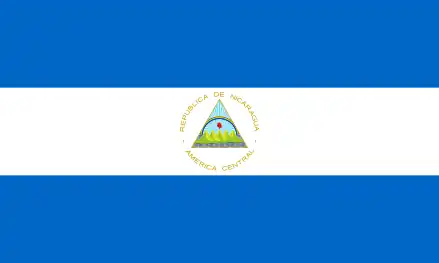| Political corruption |
|---|
 |
| Concepts |
| Corruption by country |
Corruption remains a serious problem for doing business in Nicaragua.[1]
Transparency International's 2022 Corruption Perceptions Index gave Nicaragua a score of 19 on a scale from 0 ("highly corrupt") to 100 ("very clean"). When ranked by score, Nicaragua ranked 167th among the 180 countries in the Index, where the country ranked first is perceived to have the most honest public sector.[2] For comparison with worldwide scores, the best score was 90 (ranked 1), the average score was 43, and the worst score was 12 (ranked 180).[3] For comparison with regional scores, the highest score among the countries of the Americas[Note 1] was 74, the average score was 43 and the lowest score was 14.[4]
According to Freedom House, since the election of Daniel Ortega in 2006, corruption had increased in Nicaragua.[5] Nicaragua is ranked 133 of 140 countries in the World Justice Project's Rule of Law Index (2022).[6]
Analysis
According to Foreign Policy, following his loss in the 1990 presidential election, Daniel Ortega spent the next decade building alliances with former political enemies, which helped him win the 2006 presidential election. After assuming the presidency, Ortega used various means to maintain his power in Nicaragua. Ortega "used devious legal measures to harass those who refused to align with him", which included former allies and members of the Sandinista front.[7]
Ortega then built an uneasy alliance with the business community, specifically Nicaragua's business organization COSEP, which resulted in less antagonism between his government and private business.[7][8] This move by Ortega was similar to tactics used by the Somoza family dictatorship which ruled Nicaragua for the decades prior to Ortega's ascent.[8]
According to Freedom House, Nicaragua was among its Largest 10-Year Score Declines list in its Freedom in the World 2017 report,[5][9] with the human rights organization stating:[1]
The election of Sandinista leader Daniel Ortega in 2006 began a period of democratic deterioration in Nicaragua that continues today. President Ortega has consolidated all branches of government under his party’s control, limited fundamental freedoms, and allowed unchecked corruption to pervade the government. In 2014, the National Assembly approved constitutional amendments that paved the way for Ortega to win a third consecutive term in November 2016.
Bribery
Some businesses have suggested that facilitation payments are demanded from the authorities when conducting commercial activities in Nicaragua and the government often shows favoritism towards certain well-connected companies.[10]
Cronyism
The New York Times reports that when rising to power, Ortega often used union groups to protest and for other political motives. After taking power, he granted union leaders good positions within the Nicaraguan government.[11]
According to Foreign policy prior to his re-election in the 2016 election, Ortega's wife Rosario Murillo had gained power over much of the Nicaraguan government, controlling all of the social programs of the country.[7] When Murillo became involved in politics, Nicaraguans began to compare President Ortega's family and political practices to that of the Somoza family dictatorship.[8]
By the time of the 2018–2020 Nicaraguan protests, The New York Times stated that Ortega and his wife hold power of the branches of government and media in Nicaragua. With this power, Ortega influenced judges and legislators to get rid of constitutional term limits, allowing Ortega to maintain power. Both opponents and supporters agreed that Ortega's wife, who was named vice president, held power over him. The New York Times asserted, "Few decisions seem to be made without her approval, making it clear that she is calling the shots".[11] Ortega's children have also been rewarded powerful positions within the government.[5]
Anti-corruption efforts
Generally, Nicaragua has a well-developed legislative framework preventing and criminalizing corruption. Nicaragua has also signed several international agreements, such as the Dominican Republic-Central American Free Trade Agreement and the United Nations Convention against Corruption.[12] In practicality, Nicaragua's anti-corruption institutions are highly subject to political influences.[13]
Notes
- ↑ Argentina, Bahamas, Barbados, Bolivia, Brazil, Canada, Chile, Columbia, Costa Rica, Cuba, Dominica, Dominican Republic, Ecuador, El Salvador, Grenada, Guatemala, Guyana, Haiti, Honduras, Jamaica, Mexico, Nicaragua, Panama, Paraguay, Peru, Saint Lucia, Saint Vincent and the Grenadines, Suriname, Trinidad and Tobago, United States, Uruguay, Venezuela
References
- 1 2 "Nicaragua | Country report | Freedom in the World | 2017". Freedom House. Archived from the original on 22 August 2017. Retrieved 22 August 2017.
- ↑ "The ABCs of the CPI: How the Corruption Perceptions Index is calculated". Transparency.org. Retrieved 16 July 2023.
- ↑ "Corruption Perceptions Index 2022: Nicaragua". Transparency.org. Retrieved 13 July 2023.
- ↑ "CPI 2022 for the Americas: Fertile ground for criminal networks and human rights abuses". Transparency.org. Retrieved 2 July 2023.
- 1 2 3 "Freedom in the World 2017 - Nicaragua". Freedomhouse.org. Archived from the original on 22 August 2017. Retrieved 22 August 2017.
- ↑ "WJP Rule of Law Index".
- 1 2 3 Shifter, Michael (5 September 2016). "Nicaragua Is Turning Into a Real-Life 'House of Cards'". Foreign Policy. Retrieved 2018-04-27.
- 1 2 3 Garvin, Glenn (2 May 2018). "In Nicaragua, the political battle is moving from the streets to the negotiating table". The Miami Herald. Retrieved 2018-05-03.
- ↑ "Freedom in the World 2017". Freedomhouse.org. Retrieved 22 August 2017.
- ↑ "Nicaragua Corruption Profile". Business Anti-Corruption Portal. Archived from the original on 24 March 2014. Retrieved 14 July 2015.
- 1 2 Robles, Frances (2018-04-26). "In Just a Week, 'Nicaragua Changed' as Protesters Cracked a Leader's Grip". The New York Times. ISSN 0362-4331. Retrieved 2018-04-26.
- ↑ "Convention against Corruption". Unodc.org. Retrieved 30 January 2019.
- ↑ "Nicaragua Corruption Profile". Business Anti-Corruption Portal. Archived from the original on 24 March 2014. Retrieved 14 July 2015.